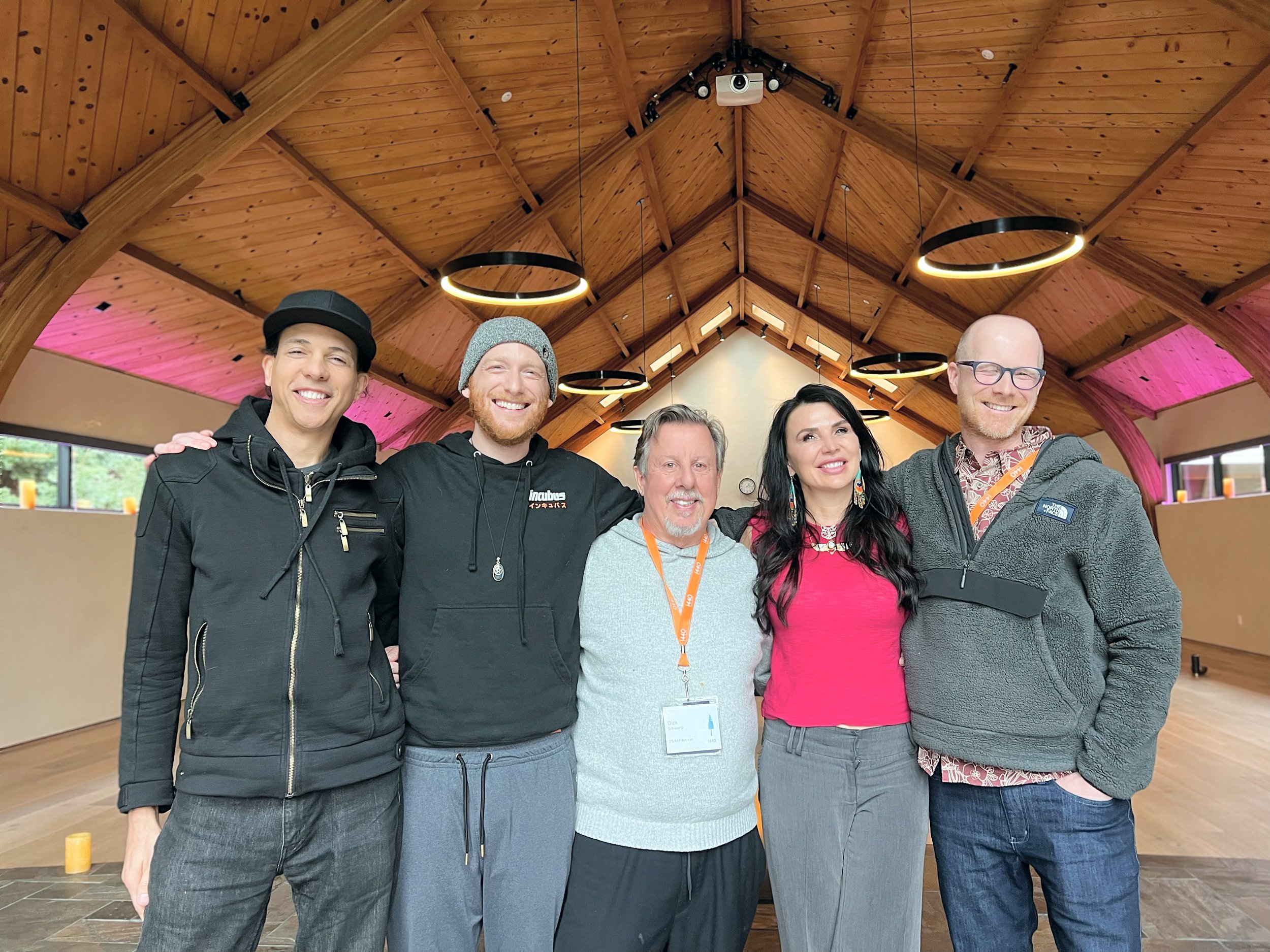
Theradelic Retreats
self-leadership Transformation
1440 Multiversity Scotts Valley, California
Join us!
A very rare opportunity to experience Sunny and Dick at an in-person retreat in 2025!
January 24-28, 2025
Be sure to sign up for the Theradelic Retreat Newsletter to get latest announcements.
Sunny Strasburg & Dick Schwartz
Theradelic Retreats: Self Leadership
Internal Family Systems Affecting Change in the Collective Sphere
For business leaders in:
✦ Technology
✦ Entertainment
✦ Healthcare
✦ Psychedelics












Sunny Strasburg, LMFT & Dr. Richard C. Schwartz welcome you for the chance to experience transformative individual and collective healing.
We are pleased to invite you to our upcoming Internal Family Systems & Ketamine Experience in the winter of 2025 at 1440 Multiversity.
This retreat is an opportunity for participants to come together and do the work of deep healing, allowing access to the 8 Cs of Self.
All experiences will be supported by IFS parts exploration and unburdening and will provide ample opportunities for integration, self-inquiry, group healing and visioning together. To hold the container that we are co-creating, we ask that all retreat participants stay onsite.
No experience with psychedelic medicines (including ketamine) or IFS is required. All participants will be asked to complete a medical & psychological intake form.
Details
Leadership Staff: Sunny Strasburg, LMFT and Dr. Richard Schwartz,
Medical Directors: Dan Ahlers, MD,
Injector, Medical Support: Julie Brody RN
IFS Support: Dr. Jeanne Catanzaro, Dave Lovas, MD
Music: David Starfire
Capacity: 34
Pricing
Includes all meetings & onsite retreat programming, 1440’s Multiversity’s highly nutritional and healthy meals, and lodging.
$8500 USD plus
3% Credit Card Fee
General Faqs
-
Our goal with this experience is to support individuals who engage in work that has significant influence in the world. We believe that as these individuals connect more deeply to Self, they will be able to amplify their impact to create positive change.
-
Please contact admin@sunnystrasburgtherapy.com Scarlet is managing the invitation process and is best positioned to understand if we have space for additional people and to assess if they meet the admissions criteria.
-
Participants will be able to arrive at 1440 Multiversity as early as 2pm PST on arrival day, with guest room check-in beginning at 4pm PST. All Participants are welcome to enjoy dinner at 1440’s Kitchen Table. Please review program itinerary for evening program start time. On the final day of the program, we close at 12pm PST, followed by lunch before departure.
-
The registration fee includes the cost for the IFS & Ketamine Experience Program, as well as four nights of overnight accommodations, and daily campus-wide signature classes offered by 1440 Multiversity. Additionally, all meals including morning and afternoon breaks are included. Pricing is based on Deluxe single rooms.
-
50% of the total retreat fee as a deposit is due by August 15, 2024. The second half of the retreat fee is due by September 30, 2024, to secure your space at the event.
Your space is secured by making your 50% deposit. Due to high demand, reservations are first come, first served basis.
-
Registration for the retreat is non-refundable and non-transferable.
In the unlikely event that the retreat is cancelled due to health concerns or otherwise unforeseen and uncontrollable events by either 1440 Multiversity, the State of California, or the Federal Government, your registration fee will be reimbursed minus the $500 administrative fee.
-
To get those most benefit from this experience we suggest the following:
(Please note that the medical and consent forms are the only mandatory requirement from the below suggestions)
Prior Therapy: Previous experience and work with a therapist is helpful. Participation in a group, like the one that we will be engaging in during this experience, can result in several benefits to you, including improving interpersonal relationships and resolution of specific concerns. Working toward these benefits, however, requires effort on your part. Participants who have already started work with a therapist will likely benefit from the retreat as a continuation of their personal work.
Meditation: It may be helpful to practice meditation in the week prior. If you already have a meditation practice, just know that some slow and regular breathing will help you as you soothe and settle for the experience.
Internal Family Systems Knowledge: Some knowledge of Internal Family Systems therapy will be helpful. We recommend reading No Bad Parts (Dr. Schwartz), The Theradelic Approach by Sunny Strasburg, LMFT and/or Introduction to Internal Family Systems are accessible books on the topic.
Participation in the Pre-Experience Zoom Call: Prior to the experience, we will hold a prep Zoom meeting to provide more specific instructions on what to pack and discuss the details of what to expect during the experience.
Completion of Medical and Consent Forms (mandatory): Once enrolled, we will need you to complete a medical intake and consent form. These forms are required to participate in the program.
FAQs
-
As part of the enrollment process, you will be asked to submit a detailed medical information form to the medical team supporting this experience. They will review in detail any issues that would prevent you from fully participating in the experience and will also be available to answer questions should you have them. All participants must be approved by the medical team and receive a clinical diagnosis to participate in this experience.
In advance of the personal medical history review, please see the general information below on eligibility for ketamine treatment:
Ketamine was approved by the FDA for use as an anesthetic agent several decades ago. Ketamine has an extensive record of safety and has been used safely as a surgical anesthetic at much higher doses than are administered in psychotherapeutic settings. The administration of Ketamine in lower, sub-anesthetic doses to treat pain, depression, or other psychiatric diagnoses is a newer, off -label use of Ketamine. Psychiatric use of Ketamine has become relatively widespread in recent years, has been studied and promoted by researchers at the National Institute of Mental Health, and has had front-page publicity as the newest antidepressant with its own novel pharmacological mechanism of action.
Ketamine has been administered by intravenous, intramuscular (IM), sublingual, oral, and intranasal routes. Often, it has been used after other treatment approaches have been unsuccessful. There are however, a few known contraindications for ketamine use.
-
Contraindications for ketamine may include:
Hypersensitivity to Ketamine: If you have had an adverse response to ketamine in the past, please let us know.
CYP2B6(*/6) Genotype: Patients with the CYP2B6(1/6) and CYP2B6(6/6) genotypes are known to metabolize racemic ketamine at slower rates (i.e., 1/2 and 1/6th, respectively) than participants with the more ubiquitous CYP2B6(1/1) genotype. If you know yourself to have a CYP2B6 polymorphism, please let us know so that your dosage may be adjusted accordingly.
Pregnancy / Nursing: The effects of ketamine on pregnancy and the fetus are undetermined, and therefore, it is advisable to protect against pregnancy while exposing yourself to ketamine or in the immediate aftermath of its use. Although there is preliminary data suggesting safety in nursing, pregnant women and nursing mothers are currently not eligible because of the lack of data on the potential effects on the fetus or nursing child.
Cardiovascular Disease: Untreated hypertension is a contraindication for ketamine use as the substance causes a temporary dose-dependent rise in blood pressure. Similarly, a history of severe heart disease where this increase in blood pressure is hazardous may make you ineligible to participate.
Pharmacological Interactions: Information on ketamine’s interaction with other medicines is only partially available. Some medications may diminish the intensity of the ketamine experience. As such, you will be asked to provide a list of all your current medications.
Hyperthyroidism: Ketamine should not be taken if you have untreated/unmanaged hyperthyroidism.
History of Psychosis/Mania: Ketamine may worsen certain psychotic symptoms in people who actively suffer from schizophrenia, bipolar mania, or other psychotic disorders.
Personality Disorders: Ketamine may exacerbate underlying psychological concerns in people with severe personality disorders.
-
Before the ketamine is administered, you will be asked to make two (2) agreements with the facilitators to ensure your safety and well-being:
You agree to follow any direct instructions given to you by the facilitators until it is determined that the session is over.
You agree to remain at the location of the session until the facilitators decide you are ready to leave.
Length of ketamine experience: The length of a ketamine experience varies from person-to-person and from experience-to-experience. You will likely be internally focused for the first 45-to-90 minutes following administration of ketamine. You will remain, to a lesser extent, under ketamine’s influence for at least one additional hour. Under the care of the retreat facilitators, ketamine will be administered via sublingual rapid-dissolve tablet or intramuscular injection.
Ketamine dosage: Appropriate dosage will be determined based on body weight, individual sensitivity, and prior exposure to ketamine and/or other psychedelics. We ask that you do not use alcohol or any non-prescription drugs before or during group sessions or prior to ketamine sessions as this may have negative emotional and/or physiological consequences.
Preparation for a ketamine session requires assessment of your readiness by the Internal Family Systems & Ketamine Therapy Retreat staff. After ketamine use, you will have follow-up discussions that focus on integration of your experience. You may ask the staff any questions you have concerning the procedure or effects of ketamine at any time. Your consent to receive ketamine may be withdrawn by you, and you may discontinue your participation at any time up until the actual injection or rapid- dissolve tablet has been administered.
-
You will be asked to lie down during ketamine administration because your sense of balance and coordination will be adversely affected until the drug’s effect has worn off (i.e., typically between two to four hours after the administration). It is possible you may fall asleep. Visual, tactile, and auditory processing are affected by ketamine. Music may be perceived in a novel fashion. Synesthesia (i.e., a mingling of the senses) may occur. Time may feel sped up, slowed down, or irrelevant.
Other possibilities for adverse effects include:
blurred or uncomfortable vision (you are advised to keep your eye mask on until the main effects have worn off)
slurred speech
confusion, excitability
diminished ability to hear or to feel objects accurately (including one’s own body)
anxiety, nausea, and vomiting*
*Because of the risk of nausea and vomiting, please refrain from eating and drinking for at least the 2 hours preceding the session. Eat lightly when you do. Hydrate well in that same time frame. If you are unduly nauseated, you may be offered an anti-nausea medication, ondansetron (Zofran), in oral dissolving tablet form.
Ketamine typically causes an increase in blood pressure. If blood pressure monitoring reveals that your blood pressure is too high, you may be offered clonidine to remedy this. Agitation may occur during the course of a ketamine session. If your agitation is severe, you may be ushered into another space where a member of the Internal Family Systems & Ketamine Therapy Retreat staff will sit with you.
The administration of ketamine may also cause the following reactions: tachycardia (elevation of pulse), diplopia (double vision), nystagmus (rapid eye movements), elevation of intraocular pressure (pressure in the eyes) and anorexia (loss of appetite). The above reactions occurred after rapid intravenous administration of ketamine or intramuscular administration of higher doses of ketamine (in a range of greater than 5 mg/kg used for surgical anesthesia). The dose to be used in this sub-anesthetic ketamine experience is much lower (2 mg/kg or less).
There are case reports suggesting that chronic abuse of ketamine in high doses can cause urinary tract symptoms and even permanent bladder dysfunction. This has not been shown to occur with clinically supervised use of ketamine.
Team Bios





